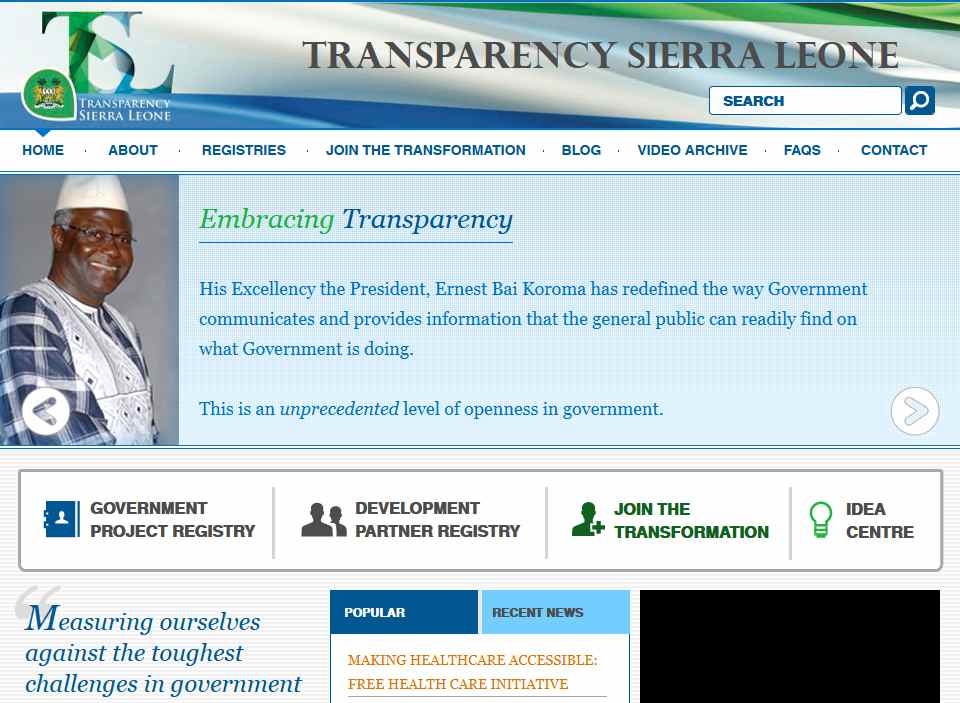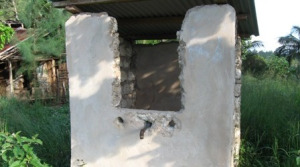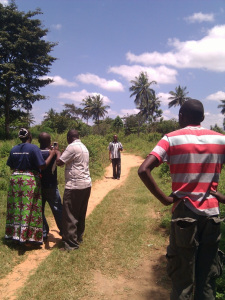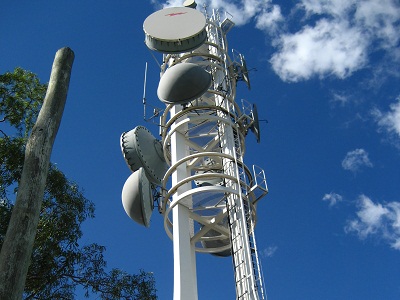This is a guest post from Jamie Lundine, who has been collaborating with Plan Kenya to support digital mapping and governance programming in Kwale and Mathare. The original was published on Jamie’s blog, titled Information with an Impact. See part 1 of this series here: Digital Mapping and Governance: the Stories behind the Maps.
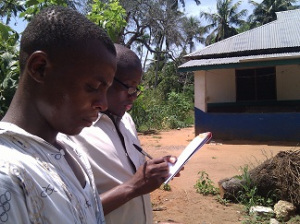
Mapping a school near Ukunda, Kwale County
Creating information is easy. Through mobile phones, GPS devices, computers (and countless other gadgets) we are all leaving our digital footprints on the world (and the World Wide Web). Through the open data movement, we can begin to access more and more information on the health and wellbeing of the societies in which we live. We can create a myriad of information and display it using open source software such as Ushahidi, OpenStreetMap, WordPress, and countless other online platforms. But what is the value of this digital information? And what impact can it have on the world?
Youth Empowerment Through Arts and Media (YETAM) is project of Plan International which aims to create information that encourages positive transformation in communities. The project recognizes young people as important change agents who, despite their energy and ability to learn, are often marginalized and denied opportunities. Within the YETAM project, Plan Kenya works with young people in Kwale County (on the Coast of Kenya) to inspire constructive action through arts and media – two important channels for engaging and motivating young people.
Information in Kwale County
Kwale County is considered by Plan International to be a “hardship” area. Despite the presence of 5-star resorts, a private airport and high-end tourist destinations on Diani beach, the local communities in Kwale County lack access to basic services such as schools, health facilities and economic opportunities. Young people in the area are taking initiative and investigating the uneven distribution of resources and the inequities apparent within the public and private systems in Kwale County.
As one component of their work in Kwale, Plan Kenya is working with the three youth-led organizations to create space for young people to participate in their communities in a meaningful, productive way. There are different types of participation in local governance – often times government or other agencies invites youth to participate (“invited space”) as “youth representatives” but they are simply acting to fill a required place and are not considered within the wider governance and community structures.
Youth representation can also be misleading as the Kwale Youth and Governance Coalition (KYGC) reports that “youth representatives” aren’t necessarily youth themselves – government legislation simply stipulates that there must be someone representing the youth – but there is no regulation that states that this person must be a youth themselves (they must only act on behalf of the youth). This leaves the system open to abuse (the same holds true for “women’s representative” – you can find a man acting on behalf of women in the position of women’s representative). Plan Kenya and the young people we met are instead working to “create space” (as opposed to “a place”) for young people in community activism in Kwale County.
The 5 weeks we spent in Kwale were,the beginning of a process to support this on-going work in the broad area of “accountability” – this encompasses child rights, social accountability and eco-tourism. The process that began during the 5 weeks was the integration of digital mapping and social media to amplify voices of young people working on pressing concerns in the region.
To create the relevant stakeholders and solicit valuable feedback during the process of the YETAM work on digital mapping and new media, our last 3 days in Kwale were spent reviewing the work with the teams. On Thursday November 10th, we invited advisors from Plan Kwale, Plan Kenya Country Office, the Ministry of Youth Affairs and officers from the Constituency Development Fund to participate in a half-day of presentations and feedback on the work the young people had undertaken.
By far the work that generated the most debate in the room was the governance tracking by the KYGC. The team presented the Nuru ya Kwale blog which showcased 28 of the 100 + projects the youth had mapped during the field work. They classified the 28 projects according to various indicators – and for example documented that 23 of the projects had been completed, 1 was “in bad progress”, 2 were “in good progress” and 1 “stalled.”
The CDF officers (the Chairman, Secretary and Treasurer of the Matuga CDF committee in Kwale County) were concerned with the findings and questioned the methodology and outcome of the work. They scrutinized some of the reports on the Nuru ya Kwale site and questioned for example, why Mkongani Secondary School was reported as a “bad” quality project. The officials wanted to know the methodology and indicators the team had used to reach their conclusions because according to the representatives of the CDF committee, the auditors gave the Mkongani Secondary School project a clean bill of health.
One important message for the youth based on feedback on their work was the need to clearly communicate the methodology used to undertake the documentation of projects (i.e. what are the indicators of a project in “bad” progress? how many people did you interview? Whose views did they represent?).
There is significant value in presenting balanced feedback that challenges the internal government (or NGO) audits – for example the data on Kenya Open Data documents that 100% of CDF money has been spent on the Jorori Water Project mentioned above, but a field visit, documented through photos and interviews with community members reveals that the project is stalled and left in disrepair. This is an important finding – the youth have now presented this to the relevant CDF committee. The committee members were responsive to the feedback and, despite turning the youth away from their offices the previous month, invited them to the CDF to get the relevant files to supplement some of the unknown or missing information (i.e. information that people on the ground at the project did not have access to, such as for example, who was the contractor on a specific project, and what was the project period).
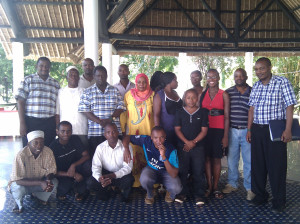
Kwale youth with staff from Plan Kenya, officers from the CDFC and the local Youth Officer
Samuel Musyoki, Strategic Director of Plan Kenya who joined the presentations and reflections on November 10th and 11th, reported that:
“The good thing about this engagement is that it opened doors for the youth to get additional data which they needed to fill gaps in their entries. Interestingly, they had experienced challenges getting such data from the CDF. I sought to know form the CDFC and the County Youth Officer if they saw value in the data the youth were collecting and how they could use it.
—
The County Youth Officer was the most excited and has invited the youth to submit a business proposal to map Youth Groups in the entire county. The mapping would include capturing groups that have received the Youth Enterprise Fund; their location; how much they have received; enterprises they are engaged in; how much they have repaid; groups that have not paid back; etc. He said it will be an important tool to ensure accountability through naming and shaming defaulters.
The 5 weeks were of great value — talking to quite a number of the youth I could tell — they really appreciate the skill sets they have received-GIS mapping; blogging; video making and using the data to engage in evidence based advocacy. As I leave this morning they are developing action plans to move the work forward. I sought assurance from them that this will not end after the workshop. They had very clear vision and drive where they want to go and how they will work towards ensuring sustained engagement beyond the workshop.”
The impact of digital mapping and new media on social accountability is still an open question. Whether the social accountability work would have provoked similar feedback from duty bearers if presented in an offline platform (for example in a power point presentation) instead of as a dynamic-online platform is unknown.
The Matuga CDF officers were rather alarmed that the data were already online and exposed their work in an unfavourable light (in fairness, there were some well-executed projects as well). There is a definite need to question the use of new technology in governance work, and develop innovative methods for teasing out impact of open, online information channels in decision-making processes and how this is or isn’t amplifying existing accountability work. There is definite potential in the work the young people are undertaking and the government officers consulted, from the Ministry of Youth Affairs and local CDF Committee (CDFC) stated that they were “impressed by the work of the youth”.
Within the community development systems and particularly the structure of devolved funding, there is a gap in terms of monitoring and evaluation (M&E) that the CDF committee to date has not been able to play effectively. As Samuel Musyoki stated the youth “could watch to ensure that public resources are well utilized to benefit the communities.” The Youth Officer even invited the youth to submit proposals for assistance in buying GPS gadgets and computers to strengthen this work.
Continuing the on and offline integration
As discussed, the work in Kwale on various issues is dynamic and evolving. The 5 weeks we spent with the teams were meant to provide initial trainings and support and to catalyse action that would be continued by the youth in the area, with support from Plan Kenya. Not only did we provide training to the young people, but Plan Kwale staff were also involved in the process and started documenting their work through the tools and techniques introduced by our team. With these skills, the Plan Kwale staff will support the on-going field mapping and new media work. We are also available to provide remote assistance with questions about strategies and technical challenges.
Some of the future activities include:
- Holding a “leaders forum” during which the youth interact with a wider cross-section of stakeholders and share their work.
- Continuing work on their various websites – updating the sites with results from social auditing work to be carried out throughout the last weeks of November, as well as digitizing previous information collected during historical social auditing.
- Validating the data by revisiting some project sites and documenting projects that haven’t been done yet, gathering stories from some of the Project Management Committees, taking more photos, and potentially conducting surveys within the communities to get more representative views on project evaluations.
- Each group also needs to develop a more structured advocacy strategy to direct their activities in these areas.
- All teams expressed interest in developing proposals to submit to the Ministry of Youth Affairs, through the Youth Enterprise Fund and CDF Committee, based on the suggestion of potential funding for this process. Plan Kwale staff, as well as some of the Country Office advisers offered to support the youth in developing these proposals.
- Most importantly, the teams want to consult the wider community in their respective areas to demonstrate the relevance of YETAM, including the skills they have gained, to the community stakeholders (beyond the relevant government authorities
The potential of new technologies, including digital mapping to promote accountability, is only as powerful as the offline systems into which it is integrated. Without offline engagement, existing community systems of trust and recognition will be threatened and thus undermine any online work. The youth must remain grounded within their existing work and use new technology to amplify their voices, build their network, share their stories and lessons and learn from and engage with others.








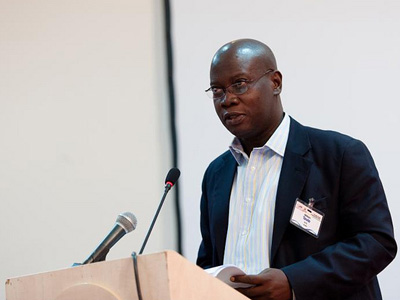


 Mapping a school near Ukunda, Kwale County
Mapping a school near Ukunda, Kwale County
 Kwale youth with staff from Plan Kenya, officers from the CDFC and the local Youth Officer
Kwale youth with staff from Plan Kenya, officers from the CDFC and the local Youth Officer
